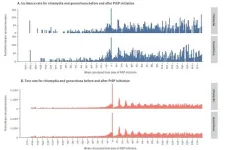PFAS constitute a class of synthetic chemicals ubiquitous in modern society due to their widespread use in industrial, commercial, and consumer products. Their persistence, which has earned them the moniker "forever chemicals," has led to their widespread contamination of water sources, soil, and air. Accordingly, there is growing global concern over the presence of PFAS in the environment and their potentially adverse impacts on human health.
To address this potential risk, the Water Safety Act included in the State’s 2018 budget provided the Collaboratory with its first appropriation of five million dollars to establish the NC PFAS Testing Network (PFAST Network) to comprehensively document PFAS contamination across the State and better understand its impacts on the environment and public health. Currently, the Network includes researchers from eight campuses – ECU, FSU, NCA&T, NCCU, NCSU, UNC-CH, UNCC, UNCW, and Duke – who study PFAS toxicology, occurrence in drinking water, atmospheric transformations and occurrence, and removal technologies. As of July 1st, 2024, PFAS funding from the NCGA will eclipse $50 million (which includes additional Water Safety Act appropriations in subsequent NCGA budgets). In its entirety, this investment represents the largest legislative funding commitment for PFAS academic research in the nation.
“Through generous recurring appropriations from the General Assembly, we have secured forever funding for ‘forever chemicals.’ The next step is continuing to learn about and research these compounds, such that new, innovative solutions can be developed to safeguard communities and ecosystems in our State and across the country. In addition, researchers are continuing to provide robust datasets and analyses to inform policymakers and State agencies to better understand this extremely complicated issue,” said Jeff Warren, executive director of the NC Collaboratory.
“We’re proud of the NC PFAST Network’s role in advancing North Carolina’s understanding of PFAS (including identifying the specific compounds found within the State, where they are found, and their concentrations), and know that the increased capabilities of these instruments will provide our researchers the technical solutions necessary to drive their research forward.”
These mass spectrometry instruments will allow researchers to detect and measure a wider range of PFAS and other emerging contaminants in water and other environmental samples. The equipment will be housed at academic institutions across the State, and will support ongoing research initiatives of the NC PFAS Testing Network on contamination and remediation, while affording expanded testing capabilities:
The new Orbitrap Astral mass spectrometer in Professor Lee Ferguson’s lab at Duke University will allow the first fully comprehensive analysis of known and unknown PFAS in environmental samples at ultra-trace levels. The Orbitrap Exploris GC systems in Professor Heather Stapleton’s (Duke) and Professor Detlef Knappe’s (NCSU) labs will allow for the detection of semi-volatile PFAS in the indoor environment and volatile thermal breakdown products of PFAS treatment technologies. The Orbitrap Exploris 240 Isotope Solutions system in Professor Ralph Mead’s lab at UNC-Wilmington will enable source-tracing and high-resolution forensic analysis of PFAS in the environment. The iCAP-TQ inductively coupled plasma mass spectrometer in Professor Pingping Meng’s lab at ECU will facilitate the development of new and sensitive total PFAS measurements for mass balance studies during PFAS treatment experiments.
“These instruments collectively provide a holistic suite of unique capabilities to the PFAST Network, unmatched by any other vendor,” said Lee Ferguson, a PFAST Network investigator. “The continued partnership between Thermo Fisher Scientific and the PFAST Network will allow for close collaboration between scientists from both organizations, maximizing the utility of these new technologies in protecting North Carolina from impacts of PFAS exposure.”
Given the concerning health and environmental implications associated with PFAS contamination, there is an urgent need for continued research and innovation to understand their behavior, mitigate their impact, and safeguard the well-being of communities worldwide. This groundbreaking investment underscores the Collaboratory’s commitment to advancing scientific inquiry and addressing pressing challenges facing North Carolina communities. With the addition of these analytical tools, the NC PFAST Network is poised to propel North Carolina to the forefront of PFAS research, driving innovation and shaping solutions for a sustainable future.
"The North Carolina PFAST Network is setting the standard for PFAS research nationwide, and we take great pride in the role our instruments play in supporting their endeavors towards a healthier, cleaner and safer world,” said Dan Shine, senior vice president and president, Analytical Instruments at Thermo Fisher Scientific.
The Collaboratory and Thermo Fisher will host a press event about the partnership in Wilmington, North Carolina on the Center for Marine Science campus of the University of North Carolina Wilmington on March 27th at 2:00 pm ET. Attendees and presenters include North Carolina Senator Michael Lee, North Carolina Representatives Deb Butler and Ted Davis, and
Department of Environmental Quality Environmental Toxicologist Frannie Nilsen, as well as representatives from the NC Collaboratory, NC PFAST Network, and Thermo Fisher Scientific.
For more information about the NC Collaboratory, please visit https://collaboratory.unc.edu/. To learn more about its statewide, comprehensive PFAS study, visit https://ncpfastnetwork.com/.
About the North Carolina Collaboratory
The North Carolina Collaboratory is an R&D funding entity, headquartered at The University of North Carolina at Chapel Hill, that partners with academic institutions, State agencies, community organizations, and industry partners to transform research into practical information for use by State and local government. Initially focused on natural resources and environmental issues, the Collaboratory has since broadened its portfolio to include research on some of the State's most pressing challenges, including within the public health, education, next-generation energy, economic growth, and technology sectors. Since its authorization in 2016 by the North Carolina General Assembly (see 31a N.C.G.S. §116-255), the Collaboratory has stewarded nearly $225 million in appropriations from the legislature, investing in over 500 research projects across all 17 University of North Carolina System campuses and numerous NC-based private colleges and universities. The Collaboratory is committed to efficiently developing innovative, evidence-based solutions that serve the State and its constituents.
About Thermo Fisher Scientific
Thermo Fisher Scientific Inc. is the world leader in serving science, with annual revenue over $40 billion. Our Mission is to enable our customers to make the world healthier, cleaner and safer. Whether our customers are accelerating life sciences research, solving complex analytical challenges, increasing productivity in their laboratories, improving patient health through diagnostics or the development and manufacture of life-changing therapies, we are here to support them. Our global team delivers an unrivaled combination of innovative technologies, purchasing convenience and pharmaceutical services through our industry-leading brands, including Thermo Scientific, Applied Biosystems, Invitrogen, Fisher Scientific, Unity Lab Services, Patheon and PPD.
# # #
END



